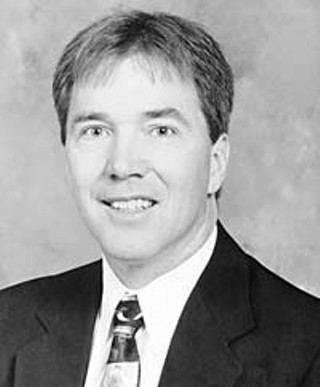To Your Health
By Lauri Apple, Fri., June 21, 2002

In transit from New York to central Austin, Jamestown-based physician and author Dr. Rudy Mueller met a woman who "only changed her doctor three times in the past five years," and a local taxi driver who hauls his father to a San Antonio hospital every week for needed care. Neither seemed troubled by these inconveniences, Mueller said -- "like it was okay. But it's not okay. It's terrible."
Mueller visited Austin June 15 to discuss his new book, As Sick as It Gets: The Shocking Reality of America's Healthcare, at a forum hosted by the Austin Gray Panthers. The Panthers support universal health care, and hoped to focus attention on inadequacies inherent in the national system, but also to give Travis County residents a chance to learn about the hospital district system that's used in many other Texas counties. About 100 people attended the four-hour event, titled "Who Lives, Who Pays, Who Dies." Other speakers were Texas Dept. of Health Commissioner Dr. Eduardo Sanchez, Travis County Probate Judge Guy Herman, and Harris County Hospital District President/CEO John Guest. The forum took place at a time when many local public officials are debating if, how, and when Travis County should create a county hospital district or a regional one.
In his book, Mueller uses dozens of tragic anecdotes to illustrate the failure of our current market-driven health care system. He's treated indigent diabetics who went without treatment and eventually required amputations, couples who couldn't marry because one partner would lose prescription coverage, and elderly people forced to choose between eating and buying medicine. The health care system is producing much "human carnage," Mueller said, and is perpetuating an underclass of people who remain impoverished because they can't afford their medical bills.
Over 42 million Americans lack insurance (including 24% of Travis County residents), and nearly the same number are "under-insured" -- for instance, one-third of Medicare recipients lack prescription coverage. Yet insured Americans also suffer, he asserts: The teacher who has switched doctors three times can't receive the continuity of care that studies show makes people healthier.
Mueller -- a self-described "fiscal conservative" -- advocates a single-payer health care system. He disputes claims made by health maintenance organizations, pharmaceutical companies, and lobbyists that such a system would lead to higher costs, bureaucracy, and longer waiting lines. "To die in the U.S., you don't have to wait as long" as citizens in other countries, he joked. "And you also get disabled sooner." Americans, on average, pay 58% more for health care than citizens in the next nine largest industrial democracies (Japan, the U.K., France, etc.); none uses a for-profit system, but all enjoy higher life expectancies, lower infant mortality rates, and fewer years of life lost to treatable illnesses.
Over 1,500 different U.S. companies offer insurance, Mueller says, and using the Organization for Economic Co-operation and Development's health data from 1998 (the last year for which full data is available), he estimates that the for-profit system wastes $90 billion in excess insurance and administrative costs. This chunk of money, plus exorbitant mark-ups for prescription medicines, drug marketing costs, and other factors, contribute to $163.6 billion in "excess sickness."
At the state level, new Texas Department of Health Commissioner Dr. Sanchez said that when he assumed his post seven months ago, "there seemed to be confusion about what [TDH] does." But he's traveled the state to identify holes in the system, and has guided the department toward prioritizing its goals -- including fitness promotion/obesity prevention, increasing immunizations (Texas ranks 50th in the nation in immunizing two-year-olds), improving the agency's business practices, preparing for bio-terrorist attacks and rapid spread of disease, and eliminating health disparities. On that last note, Sanchez said, "We cannot sit back and watch." Texas has "probably enough" money to meet the health needs of its residents, he said.
The forum closed with presentations by Herman and Guest, who discussed county hospital districts -- governing bodies with taxing authority that must be approved by a majority of voters in the county. Districts include a board, which can be elected or appointed by the local county court, and an administrator who guides policy and helps develop a budget for the court's approval. They are accountable to the public, and can be funded either by property taxes, federal or state grants, or any combination of the above. The statewide average property tax for funding hospital districts is 20 cents.
Herman and other county residents have formed a group called Citizens for a Travis County Hospital District to petition the county government for a referendum on the November ballot. Those endorsing the petition -- including the Gray Panthers, the Travis County Psychiatric Association, the Travis County Democratic Party, and the Austin Diagnostic Clinic -- believe a district would provide more funds for needed services. But while many local officials credit Herman for his motivation, some worry that he's jumping the gun. "People say, 'Let's wait to study this some more,'" Herman groused, drawing chuckles from the audience. "I've been told we need to wait until everyone's ready. But I don't have time for the people of Hays County to get squared away with their conscience."
Guest has worked on hospital districts in Bexar and Harris counties, the latter serving 3.4 million people -- over 800,000 uninsured. The key to making districts work is community involvement, he said, but warned that there are no panaceas. Although Harris County spends more than three times as much on health care as Travis County, "we have long lines for primary care doctors, congested emergency rooms, beds filled -- same as in Travis County."
Got something to say on the subject? Send a letter to the editor.








